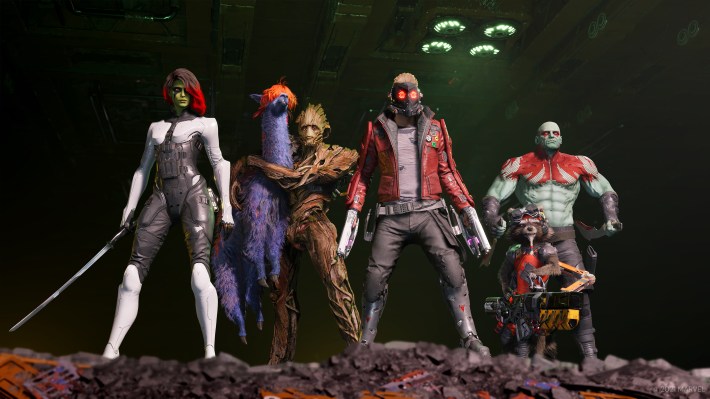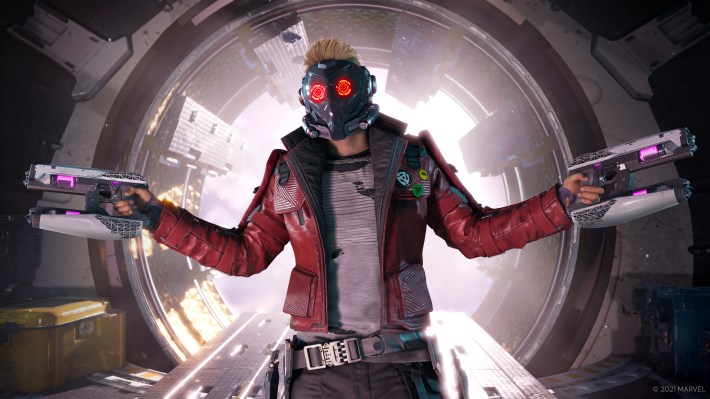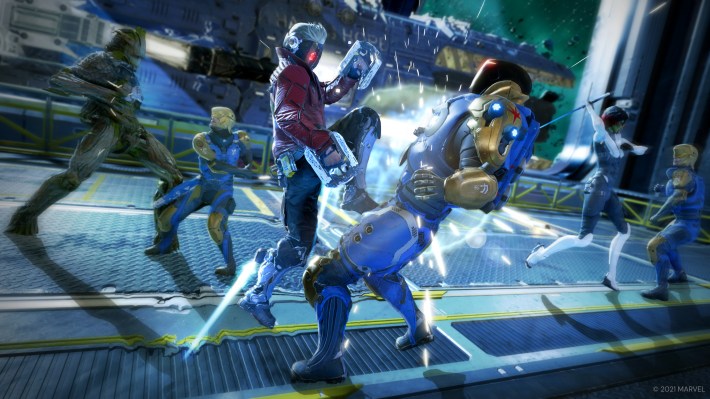The past few months have been rocky for my mental health, so I’ve come back to a reliable source of joy: fixating on a specific piece of media until it is my entire personality. My weapon of choice at the moment is Guardians of the Galaxy. I have read mountains of comics, re-watched all the movies, and bought a fan-made T-shirt. The only thing left for me to do was play the much maligned Eidos Montreal Guardians of the Galaxy video game. I really enjoyed it, which surprised me. But what I found most interesting about it was the ways the game is straining against the limitations of when it was made.
Despite strong reviews, 2021’s Guardians of the Galaxy is often credited with prompting Square Enix to sell Eidos Montreal to Embracer Group after the game’s sales failed to meet Square’s expectations. It’s a shame that this is the game’s legacy, because well, it’s fun. I was a hater about the dialogue when the game released; I was neck deep in Joss Whedon collected works, and they do actually say “that happened!” in this game. But the more I waded into Guardians recently, the more I appreciated the craft at work in its dialogue.
Guardians of the Galaxy lore is incredibly convoluted, especially because the Guardians are perhaps the biggest victims of Marvel wanting to synergize the comics with the Marvel Cinematic Universe. The first modern appearance of Peter Quill, Starlord, is in a 2004 Thanos comic, written by Keith Giffen and illustrated by Ron Lim (the character originated in 1976 as a generic space hero, but these appearances have been removed from continuity—or maybe not? It’s hard to tell.). In this appearance, Quill has cybernetics in his face and has been imprisoned in the galactic prison The Kyln for collateral damage to the tune of 350,000 people while trying to save a planet from a cosmic threat. Over time, he manages to escape prison, put together the Guardians of the Galaxy, die, then get better. When James Gunn was asked to adapt this character for a movie, a lot of this background was changed, and thus, Quill’s depiction in the comics also changed to match the movies. Gone was the grizzled war veteran, replaced instead with a snarky outlaw.

I mention this because I remember complaining with my friends that the Peter Quill who appears in this game felt too similar to his depiction in Gunn’s movies. The truth is, Peter Quill is written differently basically every time he appears. What the Eidos Montreal game does is take the best parts of all the lore of the characters and mix ‘em together into a big stew. It mostly works, but it does make one wonder who the audience for this game actually is.
Peter Quill, like the movies, is still kidnapped the day his mother dies—but she dies from being shot by aliens, not cancer. He’s still desperately grasping onto the Earth culture he remembers, but it’s hair metal and 80s pop songs instead of James Gunn’s Gen Xer classic rock. Gamora is still the deadliest woman in the galaxy and Thanos’ daughter, but like the comics, she doesn’t have a romantic relationship with Quill. Drax is overly literal, but he’s on a revenge quest to kill Thanos, not Ronan the Accuser. Rocket Raccoon still has a Brooklyn accent, but he’s from Halfworld this time. Groot is pretty much the same, and he’s my friend.
This game was released at a time when the MCU was like a parasitic entity in every facet of popular culture. This was the era of WandaVision and The Eternals and Spider-Man: No Way Home, media so mediocre and so successful that I wound myself up into a frenzy trying to explain to people on the internet why I didn’t like them. I can understand why Guardians was a hard sell in this ecosystem. It’s not enough like the movies to appeal to fans, and not dissimilar enough from the movies to appeal to non-fans. Yet in playing it, I can feel it striving to be its own thing: a very playable, charming action game that makes you feel like you’re hanging out with The Guys. The Guardians of the Galaxy here are less like a band of outlaws and more like a musical group that’s spent a little too long on the road with each other. It really gives “If This Tour Doesn’t Kill You, I Will.”

People who are irritated with each other will often come off as irritating to others. In the early portions of the game, listening to everyone argue is a struggle. But the arc here is obvious—as time goes on, everyone opens up to each other, and the way they riff as they grow closer is often very funny. In a middle game chapter, the Guardians are tasked by Cosmo, a psychic dog, to explore a destroyed space station. Drax, taking this task very literally, narrates out loud “dog report items” to send to Cosmo. Everyone in the group hates this incessant narration, but by the end of the mission Rocket has started pointing out extremely obvious dangers as “dog report items” because he knows it’ll make everyone groan. Reader: that is something I would absolutely do in real life. And I would do it because it has the same effect in this game as it does in real life. It takes the edge off of the hostility towards another person. It creates comradery. Eventually, it becomes funny.
I think when people talk about “good writing” in video games, they often mean “writing that is dark.” I appreciate the dedication to realism in dialogue here much more than twists and turns or melodrama. It becomes easier to see what audience Eidos Montreal was aiming for when you think about it in this way. They wanted the kinds of people who watch CW shows and like action movies, who might not be into the MCU but like 80s music and aren’t above the occasional pop culture reference. They want players like Peter Quill: people who grew up listening to metal songs about alien invaders, reading fantasy novels, and who have enough real life responsibilities that a twenty hour game is maybe the only thing they have time for. A general, non-gamer audience.
It’s there that the game becomes a little fraught for me, because the gameplay is what is straining against these parameters.The gameplay doesn’t suck, exactly, but while playing it I could really feel the economy of assets and mechanics. For instance, at least once a chapter, you go down a big slide. Every environment, from an alien planet to a Nova Corps battle ship, has a big ol’ slide. Once Quill gets the ice mode for his element guns, you’re constantly freezing over pipes that leak out poison gas. Enemy variety is basically non-existent. And while I disagree with the reviews at the time that said you’re not incentivized to use your fellow Guardians’ combat skills—fights feel so snappy and kinetic when you’re bouncing off your allies—I do agree that battles feel grindy, and that most bosses are just bullet sponges.

What’s most frustrating are that mechanics that are fun to play with feel like the studio just… ran out of money or time to see them through to their fullest expression. Throughout the game you’re given choices to make as Peter Quill, leader of the Guardians, and each choice does have a real impact on what happens in the story. Early on you’re given the chance to either hide illegal tech or a space llama from the Nova Corps. If you choose to hide the llama, you’ll miss out on advanced weaponry for your ship, but the llama will be able to help you escape your room when you get trapped inside it later on. Some choices happen in the heat of battle—in one scene, Gamora ran off to chase after the game’s big villain, and my Peter followed her. Not only does this make her furious with you for the rest of the chapter, it makes the boss fight way harder. All of this is great, especially because it leans on the best aspect of the game: its characters and dialogue. But it just doesn’t happen enough.
Given the privilege of time, I can understand why Guardians is like this. In some ways it reminds me of the smoothed edges of Dragon Age: The Veilguard, a game that was seeking to bring in a new audience to its longrunning fiddly RPG epic. In order to appeal to non-gamers, it made its gameplay systems less complex, gave you less interaction with its characters, simplified everything lest it make potential players confused or intimidated. No one really liked this—not me, a longtime player of Dragon Age, and not non-gamers, who I imagine felt condescended to in the same way I did.
In a post-Baldur’s Gate 3 world, it’s clear that more is more. Non-gamers don’t care if a game is extremely complex or fiddly. They like that. They like trying things and discovering what they can do. They like optional, and missable, conversations with companions. They like dying by accident, trying and failing, crowdsourcing knowledge to learn the best ways to get through combat. They like it so much that Baldur’s Gate sold 15 million copies.
Can you imagine a world where Guardians could have taken cues from Baldur’s Gate’s success? Where it could have had more systems, a more reactive environment for the element guns, more choices, more dialogue, where the infamously horny Peter Quill could have had a romance system? Where we weren’t all so fatigued by the MCU that the idea of willingly playing an MCU game didn’t feel utterly exhausting?


